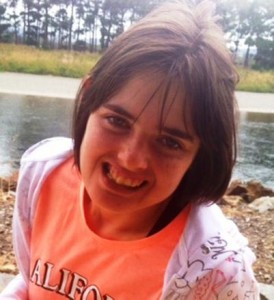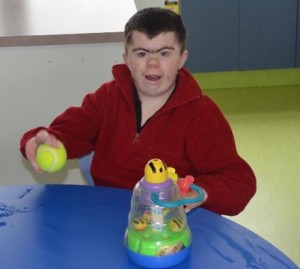This story is about two families who have gone to extreme lengths to ensure not only their own children but many families in the future have a safe, nurturing environment to grow in.
Sheri and Andy Hay’s daughter Monique is 20-years-old and has very high special needs as she has Dravet syndrome. She has autistic features and requires 24 hour care.


Julie and Roger’s son Mitchell has just turned 20-years-old. He has very high special needs as he has Cornelia de Lange syndrome and also requires 24 hour care.
These two special needs young adults are part of an increasing group that society is failing. More funding along with better support has to be found to work along-side families to enable their children to have a greater quality of life.
Attending a Standards and Monitoring Services Meeting to discuss the future care for their special needs children left both Taranaki families in shock and then anger.
Julie Landers : “The meeting didn’t go quite as we thought because everyone was there telling us that actually there is nothing available for the kids, everything is full. There is a little bit of respite care which we were both using those services. But long term there is a bit of shortage of full time residential care and we don’t know where all the kids are going to live.”
Sheri Hay : “Basically there is nowhere for them. Even in the service that we were involved with which was respite did have some long term care they were quite adamant that they were not going to expand there was not going to be anywhere for our children.
“We had a panic. We thought what on earth is going to happen? I looked at Julie’s face at that meeting and hers was like mine – really worried. What are we going to do? We have to think of something. Bricks and mortar do matter. They have to have somewhere safe to be that is permanent and real to be part of the community. Parents are not going to be around forever.”
Currently Sheri and Andy’s daughter Monique resides in Palmerston North as just before her 19th birthday the “wheels fell off”.
Sheri : “School weren’t coping with her, respite care kept sending her home, she was up all night as well so things just all got to a head. We were just like HELP what are we going to do? There was one bed in Palmerston North and nothing here. We don’t have any purpose built housing for people like Monique and Mitchell here in Taranaki.”
Julie and Roger looked at ways they could give Mitchell some independence and gain some respite knowing he was safe and cared for.
Julie : “We started renting a house in Stratford for Mitchell. He just lives there part time. It is his flat and he has three care givers. It is not sustainable or suitable long term.
“That’s been part of our respite in the last couple of years. That has worked really well for us but you don’t get enough funding as both the kids (Mitchell and Monique) need 24 hour care.”
Each family want the best that life can offer their children and a lot of time is spent researching and finding out about options.
Julie : “Sheri and Andy and Roger and I are both quite similar in our philosophies of raising our kids and we are quite proactive about making sure there are good choices and they have a good quality of life. We go out there actively looking for those things.”
Andy and Sheri set about forming a charitable trust and then Julie and Roger came on board. Now six years later Lantern House Trust has partnered with Habitat for Humanity and major sponsors Dow Agrosciences and Taranaki Electricity Trust to build a home in Inglewood. This home will not only serve their families needs but many in the future.
Sheri : “This house is initially helping five families. It will eventually help more.
“This house makes economic sense with all of us sharing resources. The kids are able to socialise and they are not isolated.”
“They talked about maybe we could put her (Monique) in a secure unit in a rest home – not suitable. Or maybe in some flat somewhere. The money that it would cost to have 24 hour care just doesn’t make any sense.
For Sheri and Andy it will be great to have their daughter close to home again but there have been some benefits from her living away.
Sheri : “What I think is really positive is Monique is living with people that aren’t her family. We are visiting her tomorrow. But she’s developed relationships and people know her and how to help her. That’s great for her so she can go out in the community and make herself known what she likes and what she doesn’t like. It’s what she needs as we won’t be here for ever.
“Working together, sharing all our resources is a really great way of everybody supporting each other and getting the best care for the kids in a great community environment.”
Until you have lived in their world many people struggle to understand things many of us take for granted.
Julie : “Until you meet the kids it is hard to explain who they are or how they are. Like I have said to people Mitchell doesn’t actually talk. They say how do you know what he wants? I say well actually he communicates really well.”
Sheri : “The same with Monique. She doesn’t have one word but she can make you understand what she needs. They have to because they have to survive.”
Julie : “It doesn’t mean that the way they communicate is wrong it’s just different to how we communicate.”
Sheri : “You have to look after the weakest members of the community. I think you have to band together and have a good as life as they can. Even though it is restricted you want them to be valued because that is all we can for them really.
“Our families are wonderful too. We wouldn’t have coped without my sister’s help. Even they get to the point where they are exhausted as well with the whole supporting situation. Independent living as much as we can do would be wonderful.”
The partnership with Habitat for Humanity is a first as they are building a fully accessible home and not their normal family home.
Sheri : “Habitat is incredible and the people that support habitat are amazing. It has been very humbling for me.”
Julie : “Me too.”
Sheri : “I just can’t believe the people that just turn up and help.”
Julie : “I just love coming.”
Sheri : “So do I, it’s such a good feeling.”
Julie : “They are neat people, just really genuinely nice people who want to help.”
As this home is the first of its kind a lot of time has been spent ensuring everyone knows their role and requirements.
Julie : “Lantern House Trust is funding the building of the house then NZ Care come in as the service provider.
“It has been specially built with large open spaces for ease of supervision and socialisation as well as mindful of accessibility for hoists and space for caregivers to be with the residents.”
Sheri : “There could be up to 12 staff on a roster as there will be at least two staff there at all times. There will be staff working through the night also as our guys quite often wake up.”
“If the kids are going out most of them will need one-or-one as they will be in a wheelchair or you need to hold their hand. There will be four young people initially and they are still looking at that.
Julie : “It’s all about the kids being in a great community, being out and about having a great life. That is what we want for them.
Sheri : “It is just used for this purpose. It can’t be sold off and used for something else. It will always be used for families like ours.”
Many organisations have donated to this project ensuring future care for other families in need for years to come.
Julie : “We received some funding from the brain injury trust when they folded in Taranaki, so we are going to have some information available at the house for anyone affected by brain injury.”
Both families want to stress that Monique and Mitchell are fun loving people and if you see them out and about be sure to say hello.
“Monique and Mitchell have got very rare syndromes. But that’s not who they are that is what they have got,” says Sheri Hay.
“My daughter is Monique Hay and she deserves as good a life as anyone.”
“My son is Mitchell Landers and he is a lovely little guy and a much loved member of our family.”
